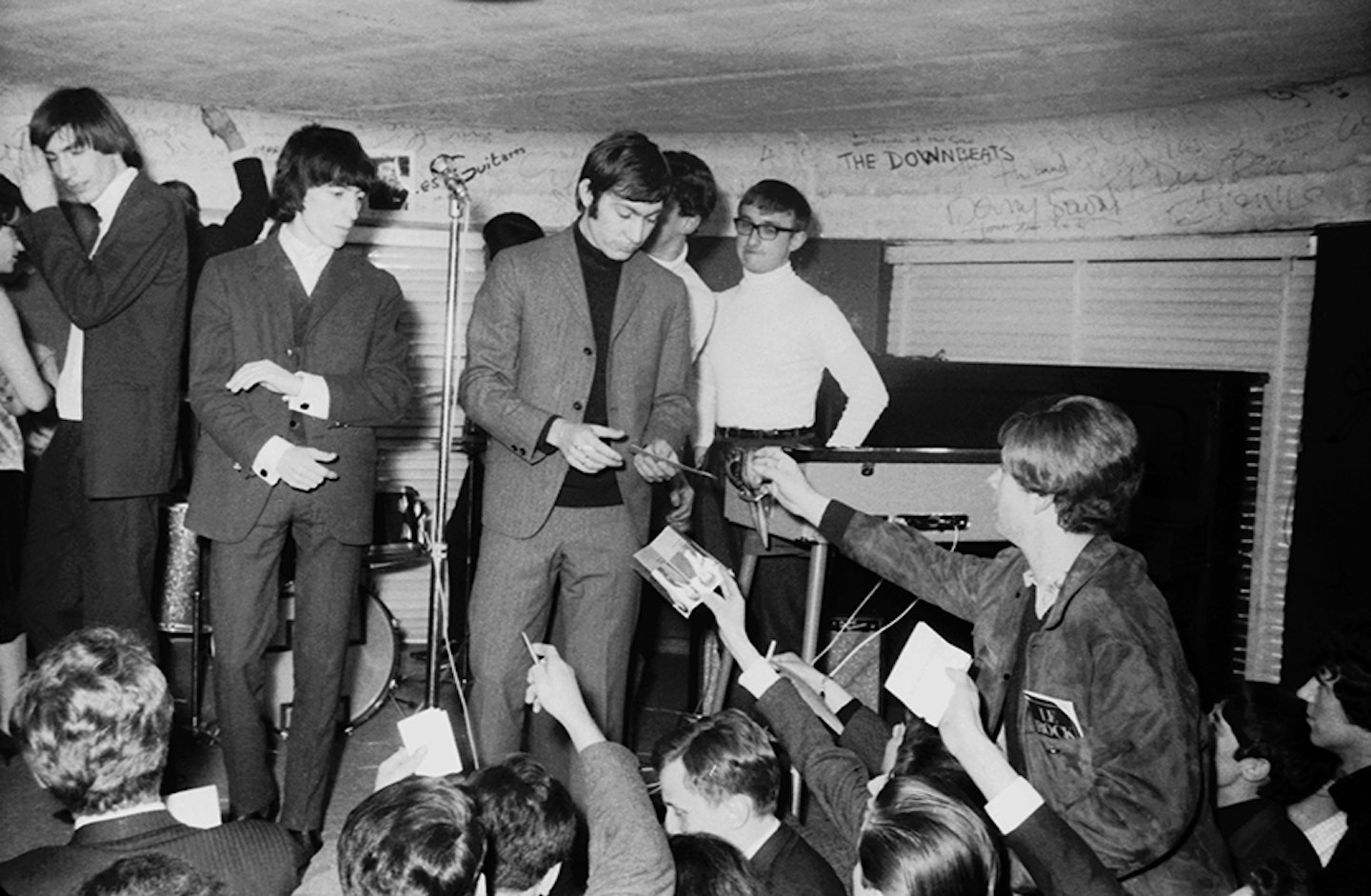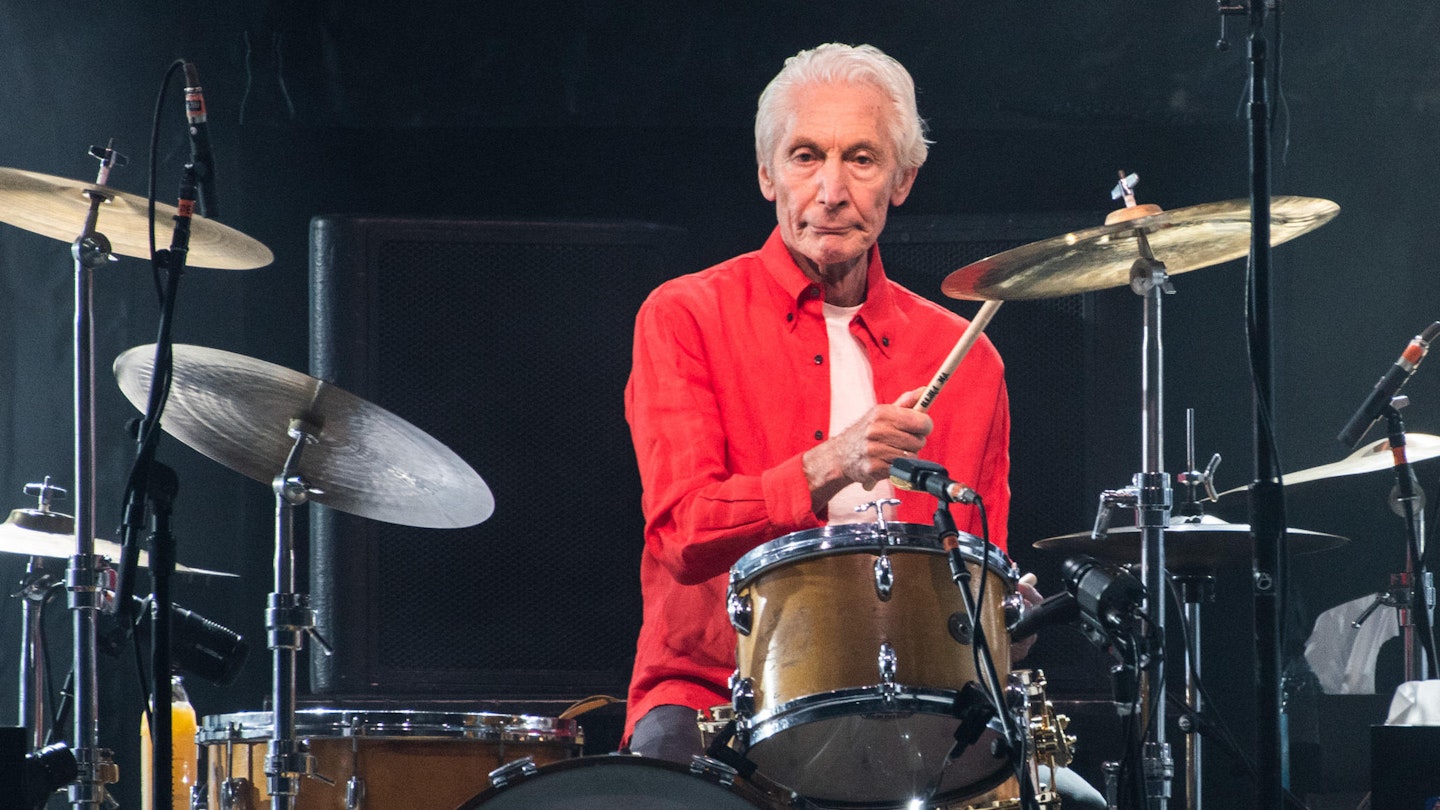Photo: Chris Tuite/imageSPACE/MediaPunch
On the eve of the resumption of their No Filter tour in 2021 - The Rolling Stones’ first gigs since the loss of Charlie Watts in August that year - Mick Jagger, Keith Richards and Ronnie Wood spoke with MOJO writer David Fricke about their memories of Watts and how he changed their music and lives.
"He held the band together for so long musically because he was the rock the rest of it was built around."
Mick Jagger
Interview by David Fricke
Looking back at Charlie, what was his impact on the sound when he joined the Rolling Stones in January, 1963? He came from a serious jazz background. What did he change in the way you, Keith and Brian Jones played blues and R&B?
Some jazz drummers don’t want to play that. But he wasn’t one of those. And he wasn’t just a straight rock drummer. We played with rock drummers before. We played with Carlo Little, who used to play with Screaming Lord Sutch’s band. He had two bass drums – it sounded great. But it wasn’t Charlie. Charlie brought another sensibility, the jazz touch. And he didn’t play very heavy. Sometimes, if I got him mad enough, he would. That was the only way I could get him to play really heavy – to get him mad.
In Midnight Rambler, he did a lot of different things in the space of one song: He got heavy, he could swing, he could do it slow. It was a concise lesson in how good he was.
He could do quite subtle cymbal work in some places. Then he could play off my [vocal] riffs with the audience. If you’re a singer, you have a relationship with a drummer which is all about the dance, the accent you’re doing physically as well as vocally. The most obvious example of that was when James Brown had a second drummer. All he’d do was hits when James moved his body or went “Hey, hey.” That guy just watched James, so if he kicked his leg in a certain way, he would accentuate it.
Charlie and I had that. We would get into a groove. He would understand what I was trying to do, and I would understand what he was trying to do. That was different from a guitar player’s relationship. And I had that with Charlie, developed over many, many years.
What do you think he saw in the Stones that convinced him want to join?
He enjoyed playing the music because it was very eclectic. He was an eclectic drummer. He loved jazz, but let’s be brutal. Jazz doesn’t pay. Of course, we weren’t getting paid much. That’s why he didn’t join us for a long while. We’d ask him to join, but he had a lot of gigs with different bands. Keith and I had already played with Charlie with Alexis Korner. It wasn’t like he came in for an audition. We knew what it was like to play with him, and he knew what it was like to play with us. He fitted in. He gave a swing to the band – the swerve and subtlety. And he could also be straight-ahead when you wanted to be. Get Off Of My Cloud – there’s nothing particularly subtle about the drumming on that. He could do that. He was in the pocket.
Many people don’t realize that as a graphic designer by trade, Charlie had a major role in the look and aesthetic of the Stones’ albums and tours. What did he bring in design and vision to the image of the band?
It was a lot of subtle touches. Album covers were very important to the image of the band. And we learned stuff from [original manager] Andrew Loog Oldham – he was into getting the right album cover, making a statement out of it. Charlie and I started to get involved early on – the fine details of the colours; the way the original photo changes in being printed; choosing typefaces.
Sometimes there were mistakes. But it was a challenge. We picked art directors, really good people we could work with on logos and stuff like that. And Charlie was very much a part of the team that designed those really big stages like the one for the Steel Wheels tour. We would kick around all these ideas to come up with these big stages. He helped me a lot with that.
Is there a special memory of Charlie – an incident or story – that sums up what he brought to the Rolling Stones and how he changed each of you in ways that people might not know?
The thing about Charlie was that he was such a quiet guy. I can’t think of that incident when he came into the room and said, “We should do this like this!” I can always remember when he sat down and played Can’t You Hear Me Knocking. He established this great rock beat, then switched it to Latin jazz.
The thing about Charlie was that he was always there, always played beautifully and was always willing to discuss what to do about it – how he could make it better. He held the band together for so long, musically, because he was the rock the rest of it was built around.
We had a lot of wonderful times apart from playing music together. We used to go and watch cricket. And when we’d get together, we didn’t talk about music. We talked about art, which he knew a lot more about than I did. But the thing he brought was this beautiful sense of swing and swerve that most bands wish they could have. We had some really nice conversations in the last couple of years about how all this happened with the band.
It’s a huge loss to us all. It’s very, very hard. But we had wonderful times, and Charlie made some wonderful music.
"Charlie was my bed. I could lay on there, and I know that not only would I have a good sleep, but I'd wake up and it'd still be rocking."
Keith Richards
Interview by David Fricke
Charlie joined the Rolling Stones in January, 1963. But you, Mick and Brian Jones had already played with Charlie when you were all in the band led by the British blues singer Alexis Korner.
He was getting paid; we weren’t. Mick, Brian and I had been drooling for Charlie for months. Charlie said, “I’d love to play with you guys, but I need a couple of regular gigs.” Then Charlie started coming to rehearsals, which was all we ever did in those days – rehearse. There never was a gig.
Charlie was fascinated by the Chicago drummers – [Jimmy Reed’s drummer] Earl Phillips; Fred Below and Francis Clay [at Chess Records]. To him, they were jazz players, not rock’n’roll, which of course they weren’t either. Somehow Charlie crossed that fine line. Charlie could make it roll and most drummers have never been able to do that.
What do you think he saw in the Stones that made him join – and stick with it?
I never did ask him that myself: “Why the hell did you join us, man?” I presume it was something he heard in the music we were listening to and trying to play. Also, he had that sense of adventure: “I’m just going to be another jazz player in a big pond. Or I can hang with these crazy guys and see where it goes.”
The thing that Charlie and I had from day one was we would cringe at the crassness of showbiz and its demands. Charlie would run a mile rather than do a promo. In a way, the difference between Charlie Watts on stage and the person is in the way he dressed: on stage, T-shirt, a pair of leisure pants and a pair of Capezios. That’s it. Whereas in real life, private life, Charlie was Mr. Style, man. His joy was to go to Savile Row and have these suits made. It was his playground. His tailor could tell you more about him than I could.

Is there a special memory of Charlie – an incident or story – that sums what he meant to you and the band?
I was jotting down a couple of things that I miss. Charlie had an incredible sense of humour. And my joy was I loved to crack him up. If you could hit that spot, he wouldn’t stop, and it was the funniest thing in the world. He had an incredible sense of humour that he kept to himself unless you sparked it. And then it could be painful to laugh.
I can’t think of any one moment, because with Charlie Watts, it was his consistency. A most vital part of being in this band was that Charlie Watts was my bed. I could lay on there, and I know that not only would I have a good sleep, but I’d wake up and it’d still be rocking. It was something I’ve had since I was 19.
I never doubted it. I never even thought about it. Only now am I thinking about it. At the same time, I know I have a very good man who understands that in Mr. Jordan. Without a drummer, you ain’t nowhere.
"The Stones got a real steal when they got Charlie."
Ronnie Wood
Interview by David Fricke
What were your earliest impressions of Charlie?
My brother Art was playing with Charlie at the time they asked him to join. Charlie said to Art, “I’ve got this offer to join the interval band over at the Marquee.” Art said, “Yeah? What are they called?” “They’re called the Rolling Stones. It might be a gig for a year or so.” That was how I first heard about Charlie. Art would come home and tell me about his friend. Then I saw them at the Richmond Jazz Festival in 1963, and the tent was moving like an elephant. I thought, “This looks like a good thing” – all this Chuck Berry music and blues coming out.
The Stones got a real steal when they got Charlie. They had other guys before, but Charlie was clearly important to them, because they asked him a couple of times to join. Charlie just did it so much better. It was a natural feel that he had. Nobody had to explain, “I want you to play like this or that.” He just had it straight away, that Stones feel.
What was it like when you played with him on your first tour with the Stones in 1975?
It was very encouraging, very inspiring. And it was reciprocal. You wanted to play right – leave the holes, the right amount of gaps. But you wanted to be dynamic in what you said with your instrument. And this is no exception, this new approach that we have at these rehearsals. Our sound man who does our monitors said, “This is the best part of my life, the Stones’ rehearsals. I never enjoy myself more.” You can’t get a bigger compliment than that.
Is there a special memory or story you have about Charlie that sums him up for you as a musician and friend?
It’s quite a famous story; you’ve probably heard it before. We were at a video shoot, in the trailer backstage, sitting around twiddling our thumbs. And somebody said to him, “Charlie, after 30 years, you must have done a lot of hangin’ about like this.” And he said, “Yeah, five years work, 25 years hanging around.” That kind of sums him up. He certainly had his powerful views. But he said it with his playing. He just spoke through his instrument.
“I’m Really Gonna Miss Him…” Ronnie Wood Pays Tribute To Jeff Beck
